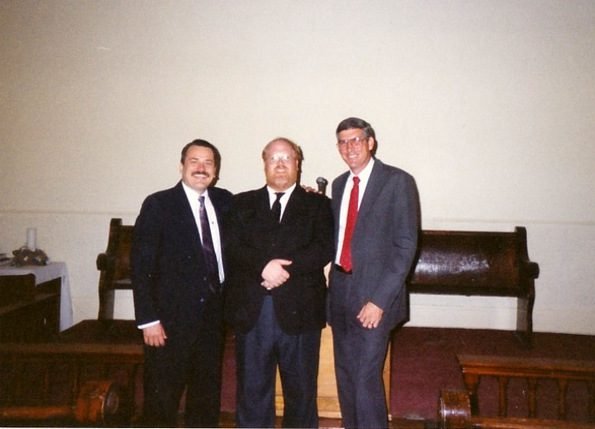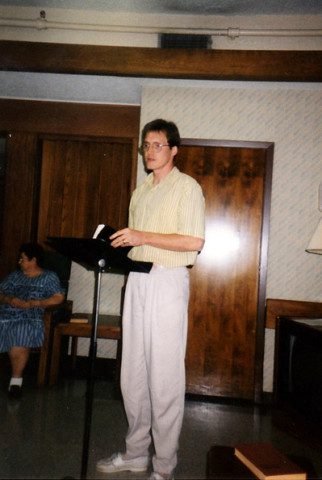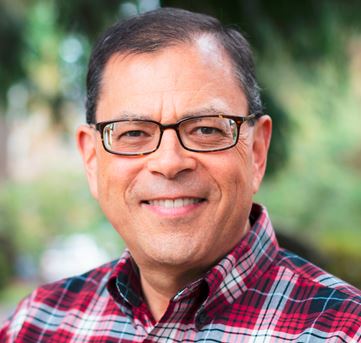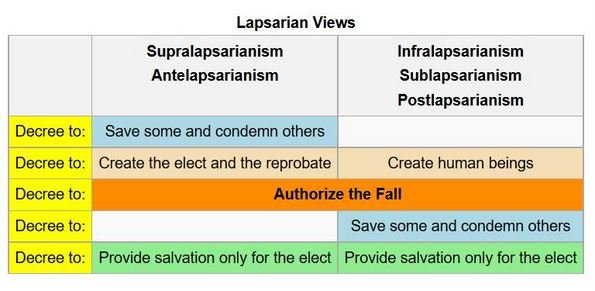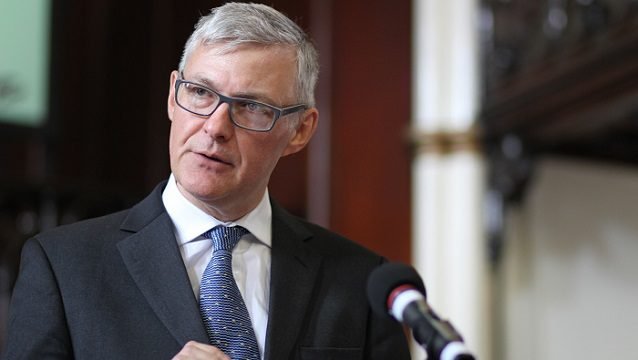
Last January, noted Scottish pastor Ian Campbell committed suicide by hanging himself after being admitted to the hospital for a drug overdose. Campbell, a member of the Free Church of Scotland — a Calvinistic sect — pastored Point Free Church in Point, Isle of Lewis. According to the Point Free website, Campbell:
contributes to the e-zine of the Alliance of Confessing Evangelicals, Reformation21, and is a frequent contributor to Ligonier ministry’s Tabletalk magazine. He is a weekly columnist for the local paper, the Stornoway Gazette.
Now that her husband’s body is lying cold in the grave, Campbell’s wife has publicly stated that her pastor husband had sexual affairs with seven church women. In a March 5, 2017 Daily Mail article, Neil Sears had this to say about Campbell’s alleged affairs:
When a leading church minister died in unexplained circumstances on the Isle of Lewis, the close-knit community was in shock.
Tributes to Reverend Dr Iain D Campbell, 53, came from around the world, while shops on the island closed for his funeral in January.
But it has emerged the father-of-three hanged himself after his 54-year-old wife Anne accused him of having up to seven affairs with churchgoers at the same time.
And now she has called on their church to kick out the women for adultery – even hiring herself a public relations professional.
The Free Church of Scotland, often referred to as the ‘Wee Frees’, is investigating while the accused women are understood to be instructing lawyers to help declare their innocence.
Dr Campbell was a leading light in the church – which has strict teachings on the sanctity of marriage and ethics of suicide – in Stornoway.
The minister had been a senior official in the Free Church and minister of the Point Free Church in Lewis, which is off the Scottish mainland’s north-west coast.
….
A source said: ‘It is said Anne was suspicious about Iain’s activities, and confronted him at the manse [a Scottish vicarage] allegedly after finding compromising emails in his computer trash files.
….
‘Anne is wanting all this to go in front of a church court and for them to throw them out of the church for adultery.
‘It will cause havoc with their marriages and the entire Free Church.
‘Even though she’s a widow people are saying Iain had a difficult home life and there’s a lot of anger towards her.’
A source close to senior church figures said: ‘There was never a whisper of a rumour about affairs until after he died – on such a close-knit island they would have been very difficult to keep secret.
‘Yet Anne has supplied names of these alleged mistresses to the church. If she is right, he had been leading an extraordinary double life for years.
‘This is a widow talking about her own late husband.
‘It’s now in the hands of senior Free Church ministers on the island – James Maciver, who conducted the funeral, and Callum Macleod.
‘This is a terrible human tragedy it is difficult to resolve.
‘A dead man can’t be disciplined and can’t defend himself.
‘Suicide is wicked, but it is possible he feared he was about to be ruined. I am hearing there is real evidence to back up these extraordinary claims.
‘But the greater fault would be with Dr Campbell who, as a minister, had a duty of care.’
They said that, if the women admitted affairs, they may be allowed to continue receiving communion. But the source added: ‘It would never be forgotten on the island.’
The women accused of affairs or their families refused to comment or made denials.
In an obituary for Dr Campbell, long-serving Free Church minister Professor Donald Macleod had written: ‘Too late, we know that he was in pain, and sometimes pain is more powerful than faith, and more powerful than reason, and altogether too much for the balance of our minds.’
….
A spokesman for the Free Church on Lewis confirmed the allegations had been made, saying the church was ‘taking these very seriously and acting on them’.
Last night a public relations professional hired by learning support assistant Mrs Campbell made no attempt to deny any details of the story, but said: ‘The family has lost a husband and father.’
According to the Scotland Herald, Campbell not only committed adultery, he also fathered a child with a woman who is not his wife. The Herald also alleges that these allegations could reach as far back as the 1990s.
There are no winners in this story. If reports are true, Campbell was living a double life, one that his wife had knowledge of before he died. While it is likely that his suicide was related to the threat of being exposed as an adulterer, we will never know for sure, because Campbell didn’t leave a note. It’s clear that Campbell’s wife Anne is hurt and angry and she is taking it out on the women who had sexual relationships with her husband. Anne Campbell’s allegation are sure to cause great havoc and damage, both in and outside of the Point Free Church. Worse, the Campbell’s adult children must not only mourn the death of their father, but also deal the fallout from their mother’s allegations.
Campbell’s duplicitous life and suicide are a real conundrum for Evangelical Calvinists on both sides of the pond. Ministerial colleagues, parishioners, and friends all praised Campbell for his devotion to Christ during his fifty-three years on earth. Campbell wrote numerous books, along with articles for Calvinistic publications. He was loved and well-respected. Now that it is known that Campbell committed suicide, and according to his wife he was screwing his way through the female church membership, I wonder what lengths Calvinists will go to square what he said with how he actually lived and ended his life.
Calvinists believe that Christians must persevere to the end to be saved. Despite all of their talk about grace, Calvinists preach a conditional salvation that requires those who say they are Christians to live lives of good works until death. Those who don’t persevere until the end — people such as myself — never were true Christians. (Actually, since I am still among the living, it is p-o-s-s-i-b-l-e that I could return to the faith, that is IF I am one of the elect.) I wonder how Calvinists will square Campbell’s ‘works’ with their theology and the clear teachings of the Bible. Consider:
There is nothing ambiguous about Galatians 5:19-21:
Now the works of the flesh are manifest, which are these; Adultery, fornication, uncleanness, lasciviousness, Idolatry, witchcraft, hatred, variance, emulations, wrath, strife, seditions, heresies, Envyings, murders, drunkenness, revellings, and such like: of the which I tell you before, as I have also told you in time past, that they which do such things shall not inherit the kingdom of God.
or 1 Corinthians 6:9,10:
Know ye not that the unrighteous shall not inherit the kingdom of God? Be not deceived: neither fornicators, nor idolaters, nor adulterers, nor effeminate, nor abusers of themselves with mankind, Nor thieves, nor covetous, nor drunkards, nor revilers, nor extortioners, shall inherit the kingdom of God.
It is with stories such as this one that the Calvinistic rubber meets the road. Campbell and his fellow Evangelical preachers — in Puritan-like fashion — view themselves as proclaimers of God’s standard of morality. Asked if homosexuals or same-sex married couples are Christian and will go to heaven when they die, I am sure that, to the man Campbell and his Calvinistic brethren would say no. Will they say the same about Campbell, a self-murderer and adulterer?
We Love Stornoway published (link no longer active) the following obituary for Campbell:
The tragic death of the Reverend Iain D. Campbell has cast a gloom over the island of Lewis such as it has never known in my lifetime; and the gloom is not confined to Lewis. Iain was a well-known figure in Evangelical circles throughout Britain, and beyond, and tributes have already come in from the USA and elsewhere.
‘He could have adorned pulpits in the largest cities in the world,’ writes Dr. Geoff Thomas of Aberystwyth, ‘or become a professor in an American seminary, but he valued the community which nourished and nurtured him, and he shared their values.’ To that community he dedicated his life, and from it he drew the strength that supported his wider ministry.
….
Iain D. Campbell was a brilliant communicator, in constant demand as a lecturer and conference-speaker. He had a quite extraordinary fluency of speech, but the fluency was disciplined by clarity, precision and careful arrangement. The delivery was effortless, though often passionate, the mastery of the subject complete, and while there was no trace of arrogance he spoke with the Bible-derived authority of a true preacher.
But he was also a master of the written word, as his many publications show, and the Free Church recognised this by appointing him Editor of its magazine, the Record, not only once, but twice. He was still serving in this capacity at the time of his death, and one of the most poignant memories we shall carry is that his very last issue (the February one) contains a photo of him in the prime of a splendid manhood, looking perfectly at peace with himself and the world. His editorship avoided controversy, but it reflected faithfully both the growing diversity within the Church and its links with the wider Christian world; and his own contributions consistently dealt with the profoundest themes at a level which was well within the compass of an intelligent laity.
Iain D was a rare combination: an academic and a natural preacher, and all who knew him assumed that sooner rather than later he would be appointed to teach at the Free Church College. Such opportunities did indeed arise and I, for one, devoutly wished to see him as either a colleague or a successor. My attempts to persuade him failed, to my chagrin, and now to my lasting regret, but the College’s loss was Point’s gain. He was inducted there on 21st August 2009, and as in his previous charges of Snizort (1988-95) and Back (1995-2009) his preaching quickly rekindled enthusiasm for the Christian message, and people who had lost their spiritual appetite found themselves once again looking forward eagerly to their Sundays and to preaching which fed their minds and stirred their souls. Thanks to the marvels of modern technology these sermons were heard all over the world and within hours of his death an American pastor was writing, ‘I never met or heard Dr Campbell in the flesh, but I knew him from sermon audios, and the sermons I heard told me all that I needed to know of the man. The reason for his high reputation was obvious. He was a man of transparent piety, for whom the Bible and the God of the Bible was a Being with whom he was familiar. The Bible irradiated everything he said, and every application he made of Biblical truth seemed so searching and personal, even though he did not know those whom he addressed. He knew men’s deepest needs and he addressed them with gentleness and compassion as one who felt for them, and wanted them to have the comfort of Christian peace. His death is a loss, not only to his immediate family and to the congregations he pastored, but to the wider church across the world.’
….
Iain D would have risen to eminence in any profession (and once toyed with the idea of becoming an SNP candidate for the Scottish Parliament), but he chose the Christian ministry, and in that chosen field he became a giant. Yet, for all the consummate ease with which he presented himself in public, he was a very private man who seldom shared his feelings, and he exuded such an aura of calm competence that none of us thought to ask, ‘Are you OK?’ Now, too late, we know that he was in pain, and sometimes pain is more powerful than faith, and more powerful than reason, and altogether too much for the balance of our minds. Bereft of him, we are traumatised, our hearts bleeding, our minds stunned and our prayers turned into protests.
I find myself swirling in a vortex of questions, narratives, disinformation, regrets and fears. St. Paul assures me that ‘God works all things together for good,’ but never has my faith in that great promise been so severely tested. How He can turn this grievous loss into good, I see not. But grace shone brightly in the life of Iain D. Campbell, such grace does not let go, and if it leads me home we shall soon be with the Lord together.
The obituary stated that Campbell was “a man of transparent piety.” Evidently, not. The obituary also said Campbell “knew men’s deepest needs.” To that, all I can say is, indeed.
While men such as David Robertson have attempted to cut off public discussion of Campbell’s immorality, this story remains a hot topic in some Calvinistic circles. From my perspective as a former Evangelical Calvinist and a pastor, this story is a reminder that preachers can and do have secret lives. (The same could be said for all of us.) It seems clear, at least to me, that Ian and Anne Campbell’s marriage was troubled and that Ian found love in all the wrong places. As mentioned numerous times in the Black Collar Crime series and other posts, Evangelical pastors, evangelists, missionaries, elders, deacons, and Sunday School teachers — supposedly pillars or morality and virtue — can be every bit as “worldly” and “sinful” as the unwashed, uncircumcised Philistines of the world.
These men of God preach thundering sermons about the sins of Adam’s race, call on all men everywhere to repent and believe the gospel, yet they themselves cannot live according to what they preach. Campbell leaves a legacy that says, now that his adulterous affairs have been exposed, do as I say, not as I do. In other words, Campbell was a hypocrite. And that would be fine, if it weren’t for that fact that Campbell, along with his fellow Calvinistic pastors, pompously dare to demand that everyone live according to the anti-human moral precepts and teachings of the Bible. When these so-called mouthpieces of God are found out to be less than their bio suggests, it is certainly fair for unbelievers such as myself to point out the hypocrisy. If Evangelicals don’t like having their sins exposed to the light of day, I suggest that they quit exposing what they believe are the moral failures of believers and unbelievers alike and admit that they are every bit as “fallen” as the rest of us.
From an atheistic and humanistic perspective, I feel sad for Anne Campbell and her children. The stain of their father’s and husband’s sin and death will be with them forever. Anne Campbell will always be viewed as a woman who extracted some sort of payback by exposing her husband’s affairs. Silent while her husband was living, Anne has unleashed her scorn and wrath on those who dared to let her husband into their beds. It will be interesting to see if the Point Free Church can survive this scandal.
Ian Campbell’s body lies in a grave, returning to the earth from whence it came. His secrets and his tragedy live on, but he does not. There is no hell, so no eternal punishment of fire and brimstone await. The only hell is that which Campbell left behind.
Note
The Free Church of Scotland, a Fundamentalist sect that is Calvinistic and Evangelical in belief, has one hundred congregations with a total membership of about 12,000.
My editor sent me the following comment:
Humans are such complex characters. It is probably unfair that we ask more of certain people than we do of others – clergy, office holders, others in high positions – and of ourselves. Of course, we despise certain characteristics in ourselves, even as we continue to engage in the despised behaviors. But we expect those to whom we admire, and those who have sought high positions, to be better than we are. I am reminded of your post just yesterday when your congregant objected when you admitted you knew what it was to lust after a woman.
I concur. It is time for Evangelicals to stable the moral high horse, and rejoin the human race. Then posts such as this one won’t need to be written. The story then is that of a bad marriage, a scorned woman, and a man who couldn’t keep his pants zipped up. It is probable that Campbell’s religious beliefs fueled his suicide attempts. Campbell broke his marriage vows, as countless people do, but such lapses don’t normally lead to suicide. Throw religion, particularly Evangelical Christianity, into the mix and that changes everything. Imagine the depths of Campbell’s guilt, fear, and shame. It is not hard to imagine a follower of Jesus, in a moment of despair, turning to suicide.
Share This Post On Social Media:
